This is the third in the Culture Mechanics series. Here are parts one and two.
Heckler’s Veto
Perhaps you’ve had this experience: you find a new show that you like, or maybe a song or album or movie; you haven’t seen anyone else talk about it, and it just exists in your world. Then at some point you read a negative review, or see your peers criticize it, and afterward, somehow, you can’t quite see it the same way again?
It happened to me once in college: a girl I liked made an off-hand comment disparaging a show that I would sometimes watch with family. It wasn’t my favorite show, but I liked it okay. But from that moment on, I felt a reflexive distancing from it any time it was brought up. When a family friend who loved the show asked with excitement if I watched as well, I deflected: oh, my parents do. I’m still a little embarrassed by that cowardice.
It wasn’t just that I didn’t want to associate with it anymore - I experienced it differently. It began to feel too embarrassing to even watch; the aspects she’d touched on just became so salient and drowned everything else out.
I notice it everywhere in my life - this web of connotations around a thing slowly growing over and replacing reality.
Cringe
It’s a deep thing that’s happening. We’re social creatures. Having a place in society has historically meant a great deal for how we fared in life - and whether we survived at all.
We’re hardwired to track social norms and group opinion, and most of the time, unless we’ve really thought it through and feel confident in ourselves, we follow the herd. We never lost those instincts.
But our circumstances have changed, and I think they’re hurting us far more now than they help - individually and collectively.
You have this module too. It’s composed of the things you know instinctively not to say or do, and that make you cringe when you remember a time you did; tripwires you’ve learned not to cross even if you couldn’t really say exactly why. I think most of us can’t even consciously see the full extent of it, this training that we’ve absorbed so much of throughout our lives.
Hell is (Groups of) Other People
I don’t feel guilt at being unsociable, though I may sometimes regret it because my loneliness is painful. But when I move into the world, it feels like a moral fall like seeking love in a whorehouse.
Sontag, As Consciousness is Harnessed by Flesh
People have always had to worry about fitting in: to sacrifice some of who they are to instead conform to the well-worn identities, behaviors, and expressions acceptable to their social world.
It’s gotten worse.
Most of it owes to the internet and media: we’ve enabled social coordination and competition like never before in our history. It is competition that drives the group to want to tear individuals down; and the extreme ease with which consensus can be formed and enforced has given it an overwhelming advantage.
These are the results:
Nothing is safe. As groups compete to tear others down, everything comes to be implicated in the contest. Your identity and traits, your opinions, your taste and style - all of it comes to carry connotation about who you fundamentally are in ways that will be used against you. Even the most minute things can become an attack surface, a way to connect you to a more established node in the evolving consensus scaffolding that the group can use to bring you down.
Nothing is simple. More straightforward norms, oppressive as they can be, are comparatively easy - you learn them and make the adjustments to follow them, and that’s generally the end of it. But the nebulous, ever-shifting norms we have now are more insidious. The uncertainty has a multiplying effect, as people will tend to try to conform and self-censor in each of the many directions something could go, just in case. It’s ungrounding - it’s very hard if you grow up in such unstable social conditions to develop a robust sense of self that can stand up to the group.
Attacks cut deep. Have you ever thought about what’s happening when an insult really lands? It’s because it touches on something that has social power: it connects you to a salient consensus node, a type, in a deep way that you can’t easily deflect. As the consensus scaffolding develops and expands, there is more and more potent fodder for the group to use in targeting you.
There’s no escape. Group norms used to not only be more contained, but they were also more localized. Even if in some areas of your life there were the kinds of toxic dynamics I am describing, you could at least avoid them and choose better environments. But now our norms are more global, their presence felt to some degree in almost every context, and it’s increasingly hard to find true refuge.1
Most have learned to hide from it and adapt - to try not to stand out too much or give anything the group could use against them, a difficult challenge that is only getting harder.
Internet Poison
If I think of my early days on the internet as a teen, it was a bit like getting to hang out with the older kids. It felt exciting - realer than ordinary life in some way, more compelling. I feel the opposite way now, but back then it felt like it was where the real action was happening, where you could peek behind the veil and learn the truth about things.
It was a kind of social superstimulus: a way to get in at the ground floor on the latest trends, norms, and values coming into vogue; to stand at the absolute cutting edge of culture. Particularly with the rise of social media, discourse online centered largely around attacks: individuals trying to tear each other and their outgroups down as they competed for status and the supremacy of their norms. The attacks weren’t always targeted at you, but you learned what the group valued, and what would make you vulnerable.
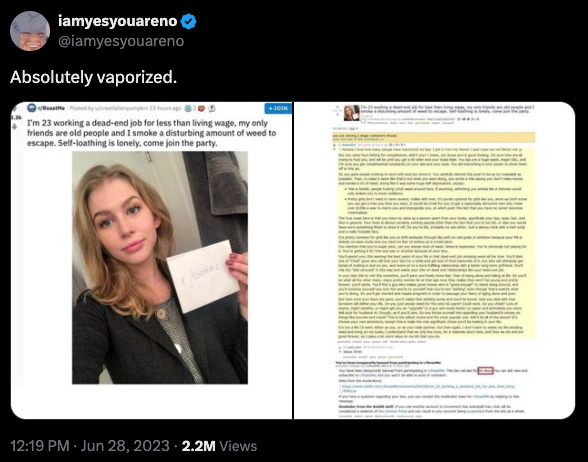
It’s almost impossible not to let this kind of exposure shape you - to push you to change the ways you express to be more aligned with the group, and to hide the parts of yourself you’ll be attacked for.
It’ll happen so gradually as to almost be imperceptible, but with time as you internalize more and more of it, it’ll shape how you perceive the world - what’s salient to you, how you see yourself and others, even what you value.
It’s ontological poison.2
I suspect it’s what people are getting at with phrases like 'terminally online’ and ‘brain worms.’ In the end you find yourself constantly looking out for and overloaded by attacks to identity and Self, and you come to parse the world in terms of them. With enough time it’ll be almost all you can see.
Self Beware
In fact, the consequence of the sexual quest is not the pleasure but, rather, the narcissistic reward, the prestige awarded by the desired partner for one’s erotic superiority
Houellebecq3
If you’re online, you’ve probably seen this video going around -
It’s funny, and I feel a bit bad posting it because I am all too aware of this impulse in myself, but the reason it went viral is because it speaks to something widespread in our culture: appearances becoming more important than reality. It looks ridiculous in person - the experience is not what she is making it out to be - but post-editing and on your feed it’d probably look amazing.
It’s an empty promise. But looking the part can almost feel more satisfying than actually being the thing - the actual, momentary experience separate from the knowledge of how you are appearing to others.
I had my own experience with it growing up. In my peer group in middle school, artistic taste was the high status thing - the kind of music you liked, the way you dressed and self-expressed, the art you created. It was the way you demonstrated your value; how you showed people who you fundamentally were.4
It was truly insane how totalizing and competitive it got. I still see vestiges of it even now, decades later, when I talk to others who grew up in it too - the reticence they’ll have to talk about the art they like; the way they’ll suppress and temper expressions of enthusiasm for fear of attaching themselves too much to something that could make them vulnerable.
I got so caught up in it that I actually mostly gave up music around my late teens and early twenties. These concerns about connotation and identity had just overshadowed the actual experience so much that I didn’t even know what I liked anymore.
The particulars of what connotes high and low status have shifted in the time since, but these dynamics seem even worse than I remember -
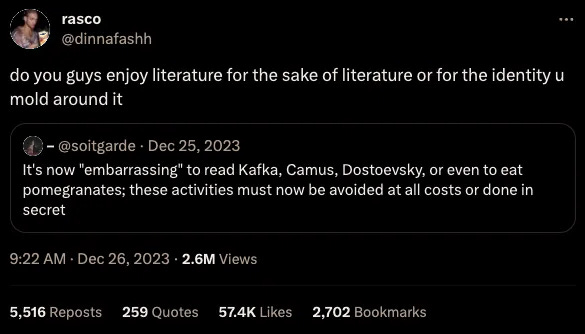
What exposure to the relentless competition and criticism of the online world does is like this, but along every dimension. And the result is to enlarge and aggrandize the Self, and make it ever more central to people’s experiences.
It hijacks our instincts, the inner workings of our social modules, and with time exposure wears on all of us, no matter how grounded and secure we otherwise are. People grow obsessed with eliminating vulnerability, and with validation and the tokens of identity resolution in all of the various forms they take.
The thing is none of it actually cashes out - the narcissistic reward Houellebecq talks about. Even the people who win that game end up miserable. It’s just empty promises.
I think this is the core spiritual sickness in our country - this preoccupation with Self and the way that we come to see the world in these terms as these dynamics intensify and spread.
Culture of Narcissism
i had a dream, recently. i was living in a wonderful house in Italy with many beautiful, famous women, and we showered outside and ate fruits from the vine and held lavish parties with our beautiful and famous friends, and every night a man would break into our house and try to kill me. he would chase me around the house grabbing at my hair and ripping off my clothes while i sobbed and sobbed and screamed for help. and here’s the crux of the dream: i would call 911 every night, but each time i called, a slick-talking Hollywood television producer would answer the phone instead. i kept calling the wrong number. i would scream into the phone anyway, desperate for an answer — i would say, help! i’m living in a house in Italy with many beautiful and famous women, and a man keeps breaking in and trying to kill me! and the woman on the phone would say, wow, you’ve really got an eye for a great pitch. we’d like to option this for a six-episode run.
and i would say, i’m not trying to entertain people, i’m trying to tell you there’s something wrong, i’m trying to tell you i need help, and she would say, well then why do you keep calling this number?
rayne fisher-quann, standing on the shoulders of complex female characters
I see the suffering from these dynamics bearing out everywhere.
Anxiety, depression, self harm, and suicide among the young seem to be rising - it’s straightforward to me the way everything I’ve been discussing here ties in. How difficult the constant fear of falling afoul of the group and of not being enough can make life, and what it does to one’s sense of connection and belonging. How empty and oppressive life can feel as you come to see yourself and the world in the terms set by the group. And how if you ever do find yourself the victim of the group, taken apart for some weakness or embarrassing thing you did, it can feel permanent under these conditions - like there’s no way you could ever come back from it.
But the ripples extend all throughout our culture.
Art is one major casualty. I see it in myself and all of my creative friends: the amount of shame and self-reproach we have have to wade through as we try to create, this overloaded social module weighing us down at every step. And the preoccupation with Self takes away from anything you do create - there is no beauty, no awe or transcendence or wonder or meaning or love in the Self. It is merely a tool for navigating our social world; everything truly good is out beyond it.
These dynamics are also much of why our politics have gone off the rails. When you give as much power and capacity to group condemnation as we have, keeping with your tribe starts to become the dominant force shaping our discourse. Without a strong ballast of internal dissent and pushback holding factions to reality, extreme views that in another era might have been kept at the fringes can suddenly gain enough momentum to become group orthodoxy almost overnight.5
They explain things like cancel culture quite neatly I think, or the ridiculous forms of guilt by association that have become widespread. It’s about attack surfaces, competition, and the way the group has been empowered; and how it leads to an environment where concerns about Self tend to override any others that might work against bad norms and currents.
I think they’re what’s behind our obsession with identity in recent years as well. Your identity is how you are understood by the group - the reductive boxes and crude terms you fall into that determine how it will judge and treat you. As the group’s opinion weighs heavier and its attacks cut deeper, competition over its terms intensifies and becomes all-encompassing.6
but, oh, it feels so good to be understood, even when it’s only as a caricature. this feeling is real because i have something to compare it to. i am in my fleabag era. i am in my yellow wallpaper era. i am in my phoebe bridgers era. i am fiona apple, i am eternal sunshine of the spotless mind, do you get it now, do you get it now.
ibid
They change the way we experience things too. It’s another injury to art, this growing layer of self-concern separating us from reality; worrying about whether something is cool or sophisticated enough to associate ourselves with it (or whatever the ascendant value might be). But the worst effects are on our relationships. When we are so harshly judgmental about what we will allow in ourselves, we can’t help apply those rules to others as well, and it gets harder and harder to see the person underneath.
I think it’s a major part of why people have fewer friends. What else is connection but feeling unguarded in the presence of another? To truly see and be seen? The Self we come to develop under these circumstances can make it almost impossible.
I don’t actually like using narcissism as a pejorative. I see it as a sympathetic condition that we all have to some extent: for whatever reason, being stuck on the problem of Self.
And that’s what all of this is doing to more and more people, making this problem harder and harder to get past.
It’d be bad enough if it just affected those directly under these negative influences. But this kind of thing doesn’t even stay online. It tends to infect anything that touches it, spreading into and taking on a life of its own in the culture.
Depatterning
Everything good is out beyond the Self.
So much of what I hate about myself are just ways I’ve learned to self-protect in these conditions; trying so hard to feel worthy of love and acceptance that I become incapable of giving them to anyone else.
I see it everywhere in my life. Little things - the way I can’t take compliments. The way I preempt lines of critique when someone comes over to my apartment - I’m sorry it’s such a mess. My jealousy for others’ successes. The way, when a friend shows me art they made, what’s most salient to me are the things I am afraid to be rather than everything that it is.
I don’t think I’m alone. What’s the way out?
Thank you for reading. If you are interested in more, here are some related resources I’ve found (ongoing - please add more in the comments):
What’s Become Of Us? by Freya India
standing on the shoulders of complex female characters by rayne fisher-quann
(tbc)
I think there are at least a few reasons for why our norms are now more global. One is the ubiquity of cameras: the spectre of being recorded and uploaded to the internet now looms in every moment, and it gives group norms incredible power where they might have been easier to skirt and shrug off previously. This globalization means much more competition between groups to assert their norms - this may be much of the what’s driving our escalating culture wars.
I think this quote was Houellebecq - I could not find the passage I originally copied this from. Also, it won’t let me make a footnote on a title, but Culture of Narcissism is a reference to Christopher Lasch’s book. I got it thinking there would be a lot of overlap with what I talk about here, but reading it I have been surprised to find little relation.
Originality was really important - it had to be from and of you; not something you were merely borrowing and wearing on your sleeve like the so-called posers and imposters. It was the reason behind the obsession with finding underground, unknown bands and art that I saw in my peers and the developing culture we were part of. If you found a good band before anyone else, it was proof-positive of your good taste: you did it without anyone’s help.
This is an important thing to realize for anyone who wants to solve these problems: if you find someone’s views to be insane, realize that they are likely load bearing in ways you (and they) probably can’t see at first. Criticizing those views can, for instance, register to your opponent as an attack on their sense of social belonging. If you want to win, give your adversaries a golden bridge: make retreat as easy as possible.
I call this increasing need to be understood in the group’s reductive terms “The Tyranny of Legibility.”

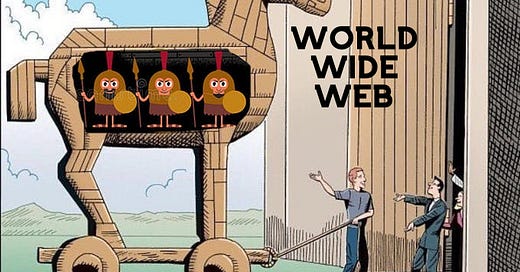



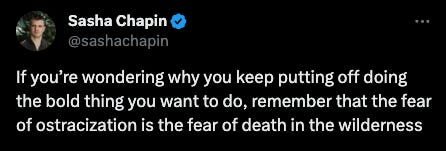
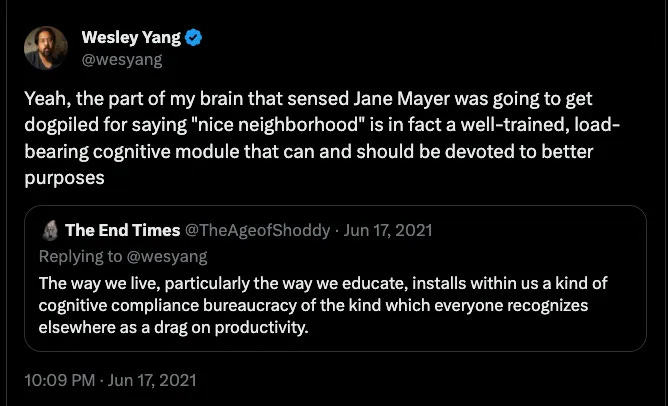
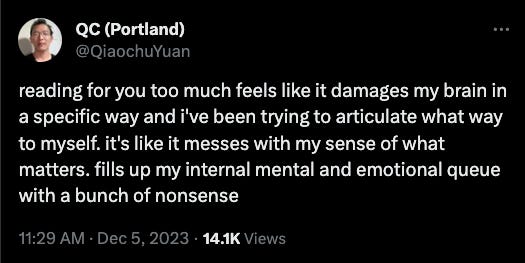
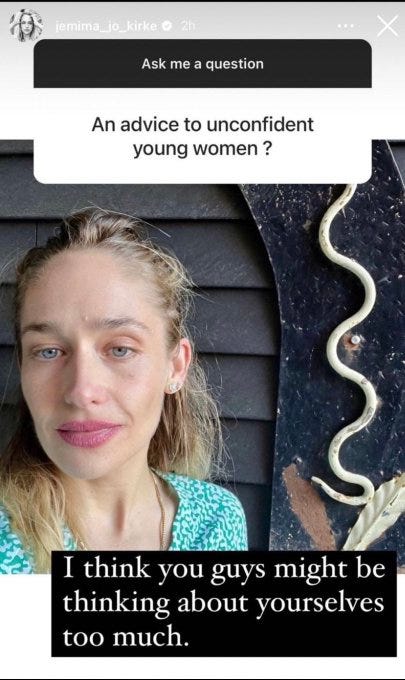
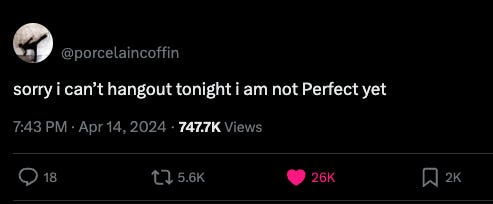
This is like a much less sardonic rephrasing of what The Last Psychiatrist has to say about cultural narcissism (preoccupation with identity). He also borrows heavily from Lasch.
Where to begin? Hard to say. Here's a few:
https://thelastpsychiatrist.com/2010/08/this_is_why_the_american_dream.html
https://thelastpsychiatrist.com/2009/02/the_action_movie_fairy_tale.html
https://thelastpsychiatrist.com/2009/01/can_narcissism_be_cured.html
https://thelastpsychiatrist.com/2009/03/what_was_the_matrix.html
Excellent post, and you've touched on a lot of salient points. To me, the most valuable takeaway and one we've all experienced in one way or another is the group dynamics that form online and only then filter into real life. So people are changing their views, attitudes, and actions to please people who they'll never meet because of our innate need to belong.
How do we rectify this? What is to be done? The only way I see forward is decentralization at many levels, including at the internet level. Large social media platforms have become ideological battlegrounds and many if not most people feel forced to take sides when they otherwise wouldn't. It's school or small-town drama on a society-wide level. I definitely don't see any easy solutions.